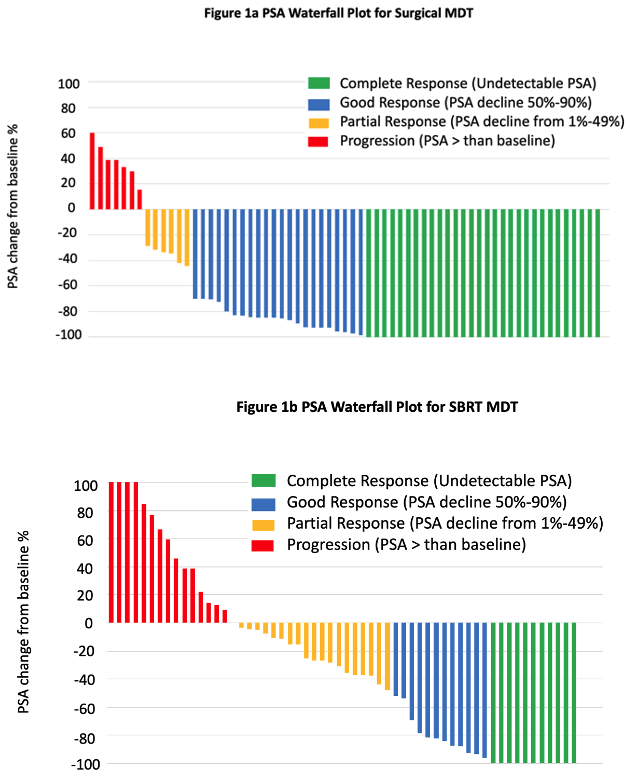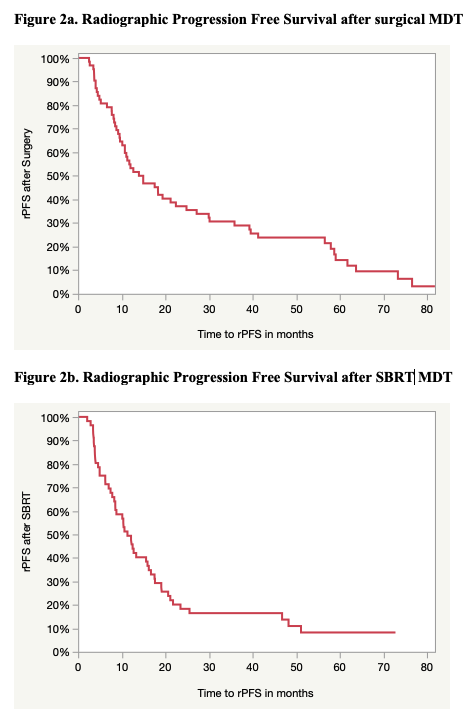Back
Poster, Podium & Video Sessions
Moderated Poster
MP48: Prostate Cancer: Advanced (including Drug Therapy) III
MP48-08: Response Rates and Survival Outcomes of Metastasis Directed Therapies in Solitary Oligo-recurrent Prostate Cancer
Sunday, May 15, 2022
2:45 PM – 4:00 PM
Location: Room 225
Mohamed Ahmed*, Jack Andrews, Vidit Sharma, Cameron Britton, Vidhu Joshi, Bradley Stish, Ryan Phillips, R. Jeffrey Karnes, Eugene Kwon, Rochester, MN
.jpg)
Mohamed El Sayed Hassan Ahmed, MD
Urology Resident at Mayo Clinic
Mayo Clinic
Poster Presenter(s)
Introduction: Much controversy exists regarding the role of metastasis-direct-therapy (MDT) in patients with oligometastatic prostate cancer. We sought to assess whether there is a role for MDT without ADT in oligometastatic prostate cancer by evaluating a select subset of patients who present early with a solitary metastatic lesion on PET imaging and whose primary tumor has already been treated.
Methods: We identified 124 prostate cancer patients from 2008 to 2018 with solitary oligo-recurrent metastatic lesions on PET imaging who were treated with MDT without ADT from the Mayo Clinic C-11 Choline registry. Patients were treated with either stereotactic body radiation therapy (SBRT) or surgical excision and these cohorts were analyzed separately.
Results: Of these 124 patients, 67 were treated with surgery (median follow-up of 54 months) and 57 patients were treated with SBRT (median follow-up of 53 months). Of patients treated with surgery, 86% had >50% decline in PSA at first follow up (Figure 1a) and a median time to radiographic progression of 15 months (Figure 2a). Of patients treated with SBRT, 51% had >50% decline in PSA at first follow up (Figure 1b) and a median time to radiographic progression of 12 months (Figure 2b).
Conclusions: This study represents the first reported series of metastasis directed therapy in patients with solitary metastatic prostate cancer. These results suggest that metastasis directed therapy alone can delay progression of disease, delay initiation of systemic therapy and may have role in the treatment of oligometastatic prostate cancer.
Source of Funding: None.


Methods: We identified 124 prostate cancer patients from 2008 to 2018 with solitary oligo-recurrent metastatic lesions on PET imaging who were treated with MDT without ADT from the Mayo Clinic C-11 Choline registry. Patients were treated with either stereotactic body radiation therapy (SBRT) or surgical excision and these cohorts were analyzed separately.
Results: Of these 124 patients, 67 were treated with surgery (median follow-up of 54 months) and 57 patients were treated with SBRT (median follow-up of 53 months). Of patients treated with surgery, 86% had >50% decline in PSA at first follow up (Figure 1a) and a median time to radiographic progression of 15 months (Figure 2a). Of patients treated with SBRT, 51% had >50% decline in PSA at first follow up (Figure 1b) and a median time to radiographic progression of 12 months (Figure 2b).
Conclusions: This study represents the first reported series of metastasis directed therapy in patients with solitary metastatic prostate cancer. These results suggest that metastasis directed therapy alone can delay progression of disease, delay initiation of systemic therapy and may have role in the treatment of oligometastatic prostate cancer.
Source of Funding: None.



.jpg)
.jpg)